Meet Dami Odetola, PfD Board Member
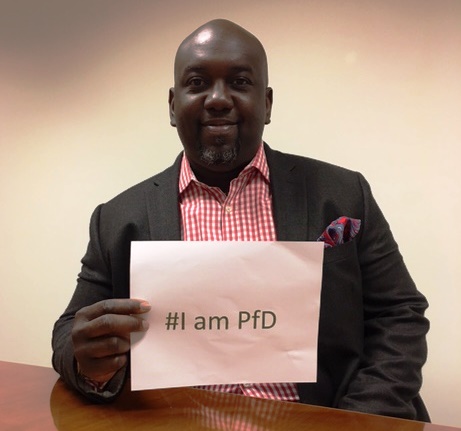
As humans, we are constantly making decisions in pursuit of fulfillment. For me, fulfillment means finding a way to serve and give back in a meaningful way, not just mere handouts. Partners for Development (PfD) is enabling me to achieve that. I am very lucky to be able to serve with an organization that is in alignment with my values and principles. My employer, the National Cooperative Bank (NCB), a mission-driven organization, also supports PfD. Lanre Ayedun, an amazing friend, past PfD employee, and current PfD Board member, introduced me to PfD and all the good work that PfD does. And I am so glad that she did.
 It’s impossible to pinpoint just one aspect of what PfD does as most impressive. How do you choose between nutrition training or capacity building or training and micro-credit or women’s empowerment or scholarships? That said, the common thread that ties all of PfD’s programs together is the inclusion of local partners in all aspects of their work. That, combined with the dedication and drive of staff, is what sets PfD apart from the others. It’s why I support PfD and why I think you should too.
It’s impossible to pinpoint just one aspect of what PfD does as most impressive. How do you choose between nutrition training or capacity building or training and micro-credit or women’s empowerment or scholarships? That said, the common thread that ties all of PfD’s programs together is the inclusion of local partners in all aspects of their work. That, combined with the dedication and drive of staff, is what sets PfD apart from the others. It’s why I support PfD and why I think you should too.
PfD’s commitment to development through training, capacity building, and overall empowerment is both sustainable and effective. I am passionate about the fact that PfD does not give fish but teaches people how to fish and then provides the resources needed to fish. PfD gives micro-credit to individuals through local partners thereby creating several levels of empowerment. For example, PfD and it’s partners are empowering women entrepreneurs: an investment that benefits families, communities, and future generations.
Should you become a PfD supporter? From my perspective, supporting PfD is the right choice for anyone that wants to make a difference in the world. Become a partner for development – take the step and contribute today. All of our donations combined will make a difference – it’ll help send a girl to school, provide clean water for a community, and prevent malaria in a village.
Put your money where your heart is. #IamPfD, are you?
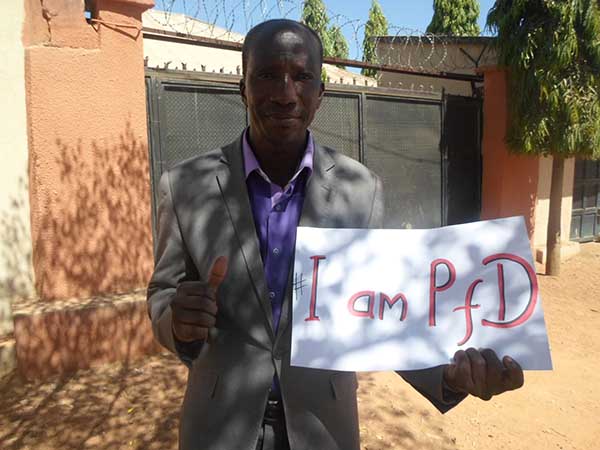
 PfD gives the greatest importance to the role of partners in every aspect of our work. We are deeply committed to involving local counterparts in assessing needs, designing programs, implementing activities and learning from the communities we jointly serve. PfD’s partner-oriented approach directs us to work with and harness the resources of the international community to meet the needs of vulnerable populations. Therefore, during our December campaign we wanted to feature one of our partners. Below is a Q&A with Pastor Ayuba Musa from Gerawa Women Multi-purpose Cooperative Society from Bauchi state, Nigeria.
PfD gives the greatest importance to the role of partners in every aspect of our work. We are deeply committed to involving local counterparts in assessing needs, designing programs, implementing activities and learning from the communities we jointly serve. PfD’s partner-oriented approach directs us to work with and harness the resources of the international community to meet the needs of vulnerable populations. Therefore, during our December campaign we wanted to feature one of our partners. Below is a Q&A with Pastor Ayuba Musa from Gerawa Women Multi-purpose Cooperative Society from Bauchi state, Nigeria.
Q: How did you first learn about PfD?
A: Gerawa Women Multi-purpose Cooperative Society is a community based rural micro-finance organization, base in Bauchi, Bauchi State of Nigeria. The organization got to know about Partners for Development in 2004. Prior to this time, Gerawa has been engaging in micro-credit program in the State at an elementary or infant stage. The institutional capacity of the organization to operate effectively and efficiently and the knowledge on micro-credit standard best practice was low. The capacity of the organization to access loan to finance its clients was low, with low portfolio strength of USD $15,000, out of which 80% of the loans were in arrears. It was at this stage that the organization team up with PfD.
Q: What led you to work with PfD?
A: Gerawa was so fascinated with PfD’s programs in Bauchi state which cut across (a) rural infrastructure development (b) small enterprise development i.e. micro-credit (c) health i.e. Reproductive health (d) and institutional capacity development/building. Taking the capacity challenge of the organization into consideration, Gerawa requested support with the micro-credit program in order to meet the need of our clients and reduce poverty level among the rural and vulnerable household women in the State.
Q: Tell us about the growth of your organization?
A: After over 10 years of good partnership with PfD, Gerawa has grown from lending USD $12,000 to $112,000 per year. Apart from micro-financing, the organization has equally benefited from the following PfD project activities:
Reproductive health training and support
- Integrated health and microfinance programming
- Expanded access to services for agricultural enterprise
- Business development skill training
- Nigeria Agricultural Enterprise Curriculum (NAEC) training and support
All these projects targeted rural women to improve their skills, increase sales and improved income. The uniqueness of implementing PfD project in the communities is integration approach to project delivery, which allows beneficiaries to access and enjoy more than one intervention at a time – holistic development.
Q: How has this partnership impacted your work?
A: The impact of the project implemented with PfD over years resulted in:
Improved Micro-finance: To date, we have issued over 3,200 microcredit loans mainly to women – 95% of borrowers are women.
Institutional capacity development of the organization: At the start of the project with PfD, an operational grant of over a million naira was received from PfD to complement staff salary and other administrative overheads. Likewise, trainings, seminars and workshops were organized by PfD to build the capacity of the implementing staff of the organization in project delivery and methodology so that we could sustain the work after the completion of the grant.
Supporting women farmers: We were able to strengthen the capacity of more than 2,000 small agricultural business holders, who were mainly women, to effectively plan, save, record, forecast, and negotiate properly for their products.
Successful program integration of health and microfinance: A total of 48 communities were reached and 2,747 women borrowers received health training and information, 11,420 immunization were given, 980 women of reproductive age received family planning commodities, 3,620 attended anti-natal care and 122 received various counseling on RH related issues.
Q: Any closing thoughts?
A: In conclusion, PfD has done great things in transforming the lives of ordinary people for the better, but there is still more to be done, thousands and millions of unreached ones are still plaguing in abject poverty and dying daily. PfD still needs more support to be able to continue doing the good work and be able to reach the less privileged.
Throughout all of December we will be sharing stories from our staff, board, partners, and others from around the globe. We can’t wait to share all of the hopeful, engaging, and positive stories from our work. We will be using the hashtag #IamPfD on Facebook, Twitter and LinkedIn.

Be sure to share the posts that you find engaging and inspiring with friends and family and don’t forget to donate and take an #unselfie of you making a donation and share it with us and use the #IamPfD for a chance to win prizes from PfD.
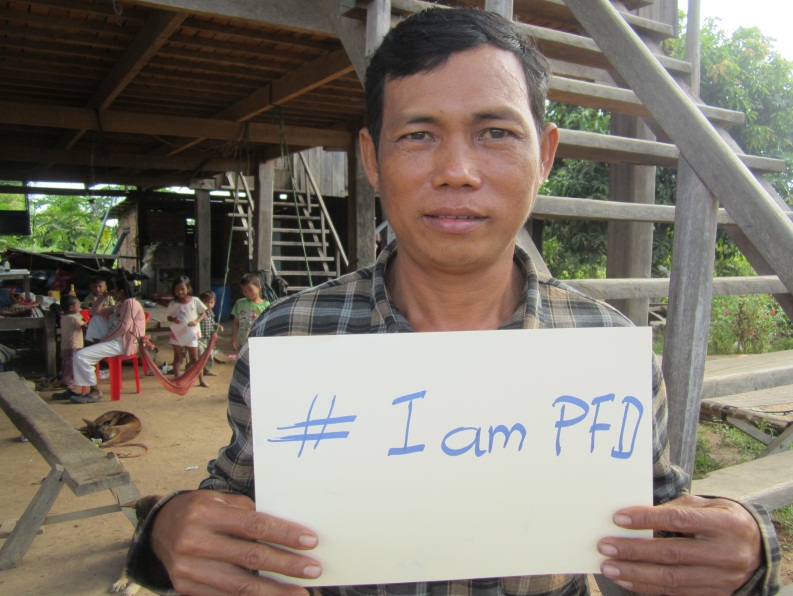
I first learned about PfD when PfD conducted malaria event and malaria education activity in my village using mobile video show. PfD also conducted many other community programs and training such as WASH, nutrition, child survival, agriculture, and chicken raising in my community. In 2013, PfD selected and trained me as Mobile Malaria Worker where I gained the knowledge and skills to provide malaria health education, diagnosis and treatment to my community members.
I am so proud to do this volunteer work.
 I have gained a lot of recognition and respect from the community members, my family, health center staff and the local authorities. I was so impressed with the malaria education activity; it informed and educated me and the community members on how to protect ourselves from malaria and where we can seek treatment when we are infected. Because I live in a malaria endemic village with lack of clean water, I am particularly passionate about malaria and WASH program of PfD’s work.
I have gained a lot of recognition and respect from the community members, my family, health center staff and the local authorities. I was so impressed with the malaria education activity; it informed and educated me and the community members on how to protect ourselves from malaria and where we can seek treatment when we are infected. Because I live in a malaria endemic village with lack of clean water, I am particularly passionate about malaria and WASH program of PfD’s work.
Our work saved our lives.
I think others should join the PfD family because PfD is the oldest NGO in Kratie Province in Cambodia and is implementing community development work to improve the quality and save lives of community members, particularly the vulnerable ones.
Throughout all of December we will be sharing stories from our staff, board, partners, and others from around the globe. We can’t wait to share all of the hopeful, engaging, and positive stories from our work. We will be using the hashtag #IamPfD on Facebook, Twitter and LinkedIn.

Be sure to share the posts that you find engaging and inspiring with friends and family and don’t forget to donate and take an #unselfie of you making a donation and share it with us and use the #IamPfD for a chance to win prizes from PfD.
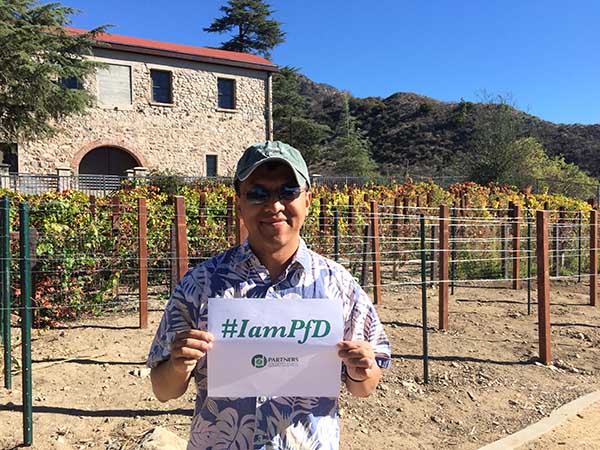

Partners for Development (PfD) came to my attention in 2011 when the PfD Board Chair wrote to me after watching myTED Talk about “Escaping the Khmer Rouge” (see below). At the time I taught at the US Naval Postgraduate School. The connection was that PfD had long worked in Cambodia since the early 1990s, when the country emerged from conflict following the Paris Peace Accords of 1991. It was fitting that someone like myself, a refugee from Cambodia who escaped thanks to my late mother’s cunning and determination in 1976, one year into the reign of the Khmer Rouge, would go on to work at the World Bank and the United Nations Development Programme. But what’s even more interesting is that after years of working for international bureaucracies, I became a scholar and critic of traditional development assistance and came to see the important work that PfD does working with vulnerable and underserved populations in developing countries to improve their quality of life.
I joined PfD’s Board in 2013, the same year I published Aid Dependence in Cambodia: How Foreign Assistance Undermines Democracy. Earlier this year, I even gave a book talk at PfD headquarters. Be sure to join our mailing list to be invited to future events like these.
PfD is not afraid of introspection and looking at what works, what doesn’t, and why. I could already see the importance of PfD’s work in 2012 when, as a Trustee of the Nathan Cummings Foundation, I arranged a large Board Recommended Grant for PfD.
Indeed, it’s a pleasure to work with PfD and to serve as a Trustee; the team is small and responsive, squeezing the most value out of your dollars for maximum impact in the field. Partners for Development isn’t just a name, it’s a philosophy that gives the greatest importance to the role of partners in every aspect of our work. This includes a deep commitment to involving local counterparts in needs assessments, program design, and implementation.
I’m in, and I think you should be too. Donate to PfD today!
In Partnership,
Sophal Ear, PhD
Associate Professor, Diplomacy & World Affairs
OXY | Occidental College, Los Angeles, California
Aid Dependence in Cambodia: How Foreign Assistance Undermines Democracy (Columbia University Press, 2013)
The Hungry Dragon: How China’s Resources Quest is Reshaping the World (Routledge, 2013) with S. Burgos
Throughout all of December we will be sharing stories from our staff, board, partners, and others from around the globe. We can’t wait to share all of the hopeful, engaging, and positive stories from our work. We will be using the hashtag #IamPfD on Facebook, Twitter and LinkedIn.

Be sure to share the posts that you find engaging and inspiring with friends and family and don’t forget to donate and take an #unselfie of you making a donation and share it with us and use the #IamPfD for a chance to win prizes from PfD.
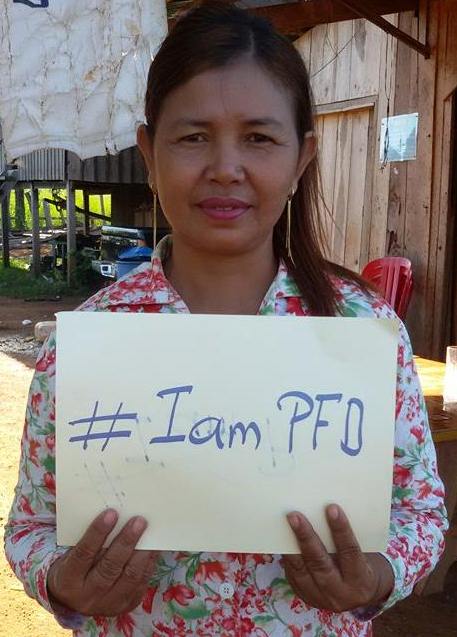
Ms. Nub Chin and her family currently live in the malaria endemic forest village of Chhour Krang in Thmey commune, Snoul district, Kratie Province. With her family she lives in a village impacted by deforestation and climate change. Many of her fellow villagers are smallholder farmers who work on their farms daily in order to make a living. Malaria significantly impacts their work-life when it goes untreated.
 Although malaria is easy to treat, it is a problem for many, like the Chin family, who do not have access to health center or health practitioners. Like many in her village, Ms. Nub Chin has personally experienced dealt with malaria. Ms. Nub Chin and her daughter frequently got malaria in part because they didn’t understand the causes of it nor did they know how to prevent it. They believed that a spirit caused malaria and sought treatment from a traditional healer (Kru Khmer) leaving their condition un-treated.
Although malaria is easy to treat, it is a problem for many, like the Chin family, who do not have access to health center or health practitioners. Like many in her village, Ms. Nub Chin has personally experienced dealt with malaria. Ms. Nub Chin and her daughter frequently got malaria in part because they didn’t understand the causes of it nor did they know how to prevent it. They believed that a spirit caused malaria and sought treatment from a traditional healer (Kru Khmer) leaving their condition un-treated.
When they got sick with malaria, Ms. Nub Chin and her family were left with two options: 1. Spend a lot of money on transportation to reach the public health center dozens of kilometers away or 2. Seek treatment from the private health provider which is closer, but more expensive.
Ms. Nub Chin was motivated to change this!
After attending the malaria health education training provided by PfD, Ms. Nub Chin learned about the cause of malaria infection and treatment options. After the training, she expressed interest in volunteering to help her village. With training and support from PfD, Ms. Nub Chin became a Village Malaria Worker. As a Village Malaria Worker, Ms. Nub Chin has not only helped protect her family from malaria infections, but she has helped all the villagers, particularly the vulnerable ones, from malaria infections. In addition, she is able to save the money that she would have spent previously on malaria treatment.
Ms. Nub Chin is not only a trained Village Malaria Worker who provides malaria education, diagnosis and treatment in her village, but she has also offered to take her motorcycle to other nearby villages to provide education, diagnosis and treatment to other key affected population such as forest workers, seasonal migrant workers and smallholder farmers.
In the simplest of terms, Ms. Nub Chin is saving lives.
 Her motivation and dedication have helped prevent and treat hundreds of malaria cases. Because of women like Ms. Nub Chin, families in her village and surrounding villages are able to continue farming and save the money that would have otherwise been spent on malaria treatment to help feed their families and educate their children. Per month, Ms. Nub Chin provides health education to about 20 villagers on average, conducts around five blood tests among malaria suspected cases to screen for malaria, and provides treatment to all confirmed malaria cases.
Her motivation and dedication have helped prevent and treat hundreds of malaria cases. Because of women like Ms. Nub Chin, families in her village and surrounding villages are able to continue farming and save the money that would have otherwise been spent on malaria treatment to help feed their families and educate their children. Per month, Ms. Nub Chin provides health education to about 20 villagers on average, conducts around five blood tests among malaria suspected cases to screen for malaria, and provides treatment to all confirmed malaria cases.
Only with the leadership and dedication of local volunteers will we be able to tackle some of the biggest health challenges facing our world today. PfD strongly believes that Ms. Nub Chin is an example of the dozens of other local volunteers in Cambodia and around the world.
Throughout all of December we will be sharing stories from our staff, board, partners, and others from around the globe. We can’t wait to share all of the hopeful, engaging, and positive stories from our work. We will be using the hashtag #IamPfD on Facebook, Twitter and LinkedIn.

Be sure to share the posts that you find engaging and inspiring with friends and family and don’t forget to donate and take an #unselfie of you making a donation and share it with us and use the #IamPfD for a chance to win prizes from PfD.
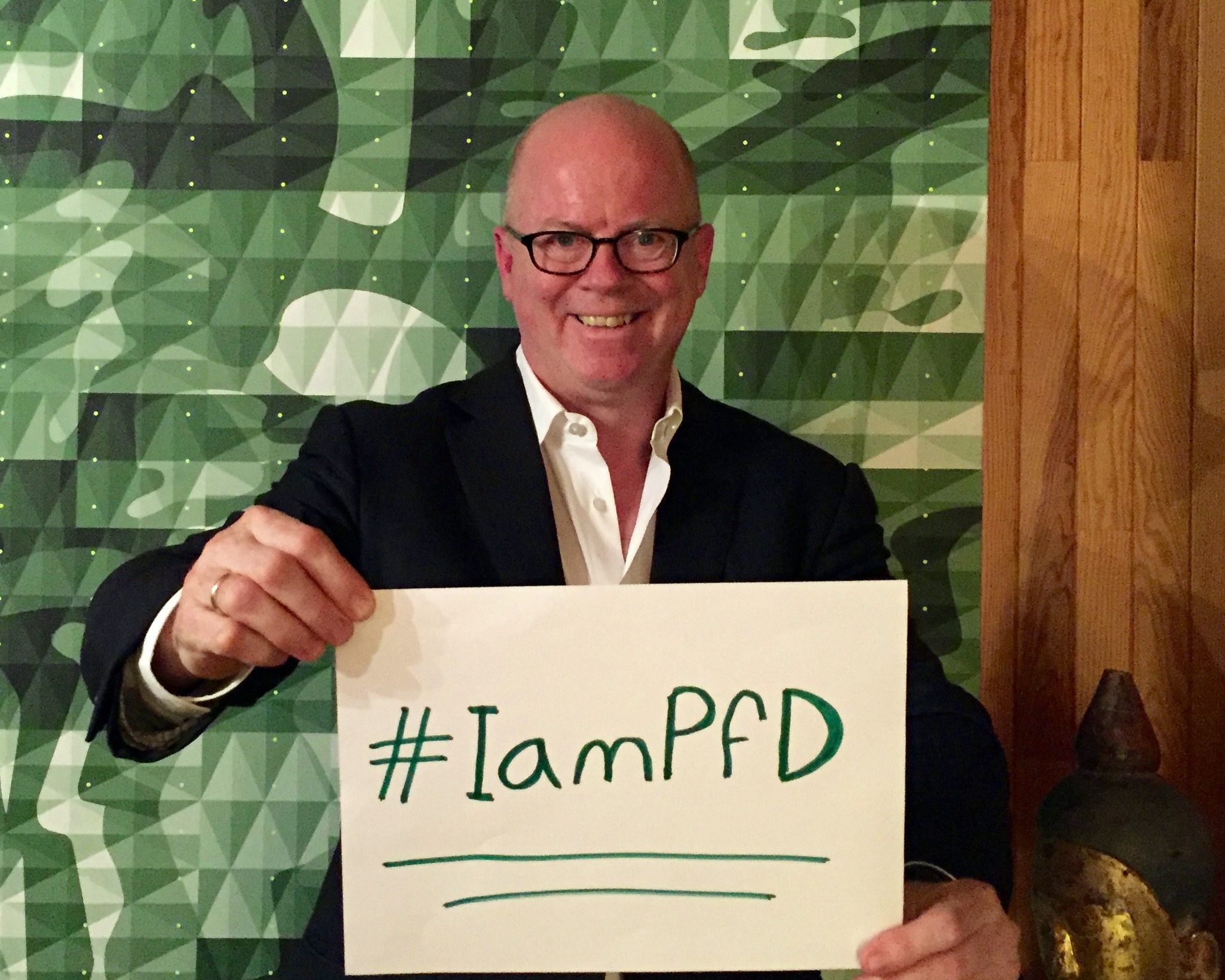
Greetings from Geneva,
My journey with Partners for Development (PfD) has allowed me to see the organization from the inside out; therefore, I wanted to reach out to you and share my story. I have been working in the relief and development field for over 25 years and had the privilege of working with PfD from 1994 to 2002. I served at their headquarters and in two countries (Somalia and Cambodia) and several years ago I was elected to the Board of Trustees. Though my role has changed, my dedication and resolve for PfD has not. I encourage you to get to know the organization better and I have no doubt that you will come to love and support the organization in the same ways that I have.
My friends and colleagues often ask why I am so gung-ho about PfD. PfD’s tendency to work “off the tarmac” in oftentimes remote and unforgotten parts of the world sets them apart. When I served as PfD’s Country Director in Cambodia, our community health and development activities focused on the distant, difficult to access provinces in the Northeast. Nearly all our staff and resources were dedicated to serving these provinces and PfD teams were primarily comprised of people from these provinces. Many of the communities in which PfD worked were accessible only by long, arduous motorbike trips. Fun fact: PfD was the first major distributor of mosquito nets in the region.
PfD’s flat hierarchy and the small but dedicated headquarters staff make them nimble and extremely responsive to the field teams and the communities in which they work. Did you know that PfD’s Silver Spring office operates with a team of 6? I like the fact that a technical support officer in Nigeria can send an email to PfD’s Executive Director and expect a timely response from him. There is little to no bureaucracy and that is how I know my donation has the greatest impact.
I am proud to be formally affiliated with PfD and urge you to learn more about how YOU can support us!
Thank you,
Michael Chommie
Geneva

Throughout all of December we will be sharing stories from our staff, board, partners, and others from around the globe. We can’t wait to share all of the hopeful, engaging, and positive stories from our work. We will be using the hashtag #IamPfD on Facebook, Twitter and LinkedIn.

Be sure to share the posts that you find engaging and inspiring with friends and family and don’t forget to donate and take an #unselfie of you making a donation and share it with us and use the #IamPfD for a chance to win prizes from PfD.
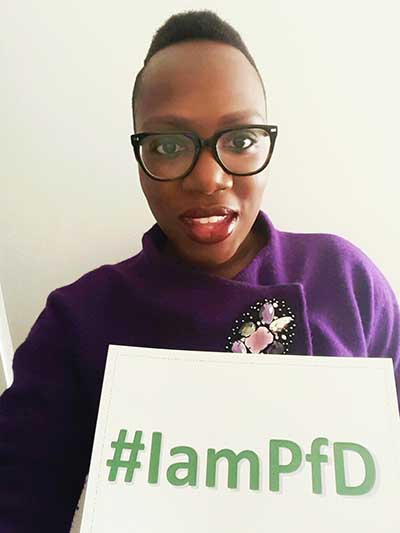
When you are a young international student who has just discovered that your liberal arts undergraduate degree won’t feed you, life is very complicated. That was me, 12 years ago. I had just finished a bachelor’s degree in Psychology and realized that I was not employable. I desperately wanted to make a difference in the world, to help people. As naïve as that sounded, even to me, I knew that I wouldn’t be able to do that without some tangible skills and a lot more experience under my belt. A friend suggested I apply for an internship at the company she worked for, Partners for Development. That was in 2005. Over the last 10 years, PfD has become an integral part of my life, career, and passion.
 I started off in the often thankless job of being an intern—except at PfD it wasn’t thankless. Every day I felt that my work was meaningful, appreciated, and valued—whether I was doing desk review for a proposal, cleaning up data from our programs, or copy editing a report. I was given the opportunity to travel to field programs in Nigeria, Bosnia, and Cambodia; I presented on my travels to the Board of Trustees and got to give them my recommendations on possible next steps; I pulled all-nighters with PfD staff getting proposal documents submission-ready.
I started off in the often thankless job of being an intern—except at PfD it wasn’t thankless. Every day I felt that my work was meaningful, appreciated, and valued—whether I was doing desk review for a proposal, cleaning up data from our programs, or copy editing a report. I was given the opportunity to travel to field programs in Nigeria, Bosnia, and Cambodia; I presented on my travels to the Board of Trustees and got to give them my recommendations on possible next steps; I pulled all-nighters with PfD staff getting proposal documents submission-ready.
I was very excited in 2006 when I was able to lead a team of fellow graduate students to do a review of PfD’s integrated microfinance and reproductive health program in Nigeria. To this day, my friends and I still talk about the stories of the women that we met in rural villages, who told us what they had learned in their microcredit groups, and how the money they had jointly saved was making a brighter future a reality for their households. And I have countless other such stories from my work with PfD. I know, personally, that when we talk about the local impacts that PfD’s programs have—there are real people and real lives that have been pointed in a better direction because of PfD.
I went on to work at PfD headquarters for two more years before moving to another organization, but I stayed in touch, hoping I would find a sustained way to stay engaged with the organization. Three years ago I was invited to join the Board of Trustees, which I accepted with great pride.
There are many compelling reasons to support PfD—the programs are solid, the management is efficient, the impacts are real. But most of all, PfD believes in people—be they interns, local staff, or program beneficiaries; and in the end, that is the kind of organization that I want to be associated with. PfD made me the international development professional that I am. PfD trained me to do rigorous work that respects the people I am working for. PfD taught me how to enjoy working with a diverse group of people, and to invest in them. PfD showed me good development that empowers local communities and magnifies local solutions. PfD showed me what it means to see value in a young Nigerian girl who just wanted to make a difference in the world. #IamPfD
Throughout all of December we will be sharing stories from our staff, board, partners, and others from around the globe. We can’t wait to share all of the hopeful, engaging, and positive stories from our work. We will be using the hashtag #IamPfD on Facebook, Twitter and LinkedIn.

Be sure to share the posts that you find engaging and inspiring with friends and family and don’t forget to donate and take an #unselfie of you making a donation and share it with us and use the #IamPfD for a chance to win prizes from PfD.

Throughout all of December we will be sharing stories from our staff, board, partners, and others from around the globe. We can’t wait to share all of the hopeful, engaging, and positive stories from our work. We will be using the hashtag #IamPfD. Be sure to follow PfD on social media – see links below.
Be sure to share the posts that you find engaging and inspiring with friends and family and don’t forget to donate and take an #unselfie and share it with us and use the #IamPfD for a chance to win prizes from PfD.

Partners for Development (PFD) was fortunate to have a twenty-year relationship with Anne Johnson.
In 1993, Anne coordinated war-time assistance in Bosnia and Herzegovina. In supporting her team of two expatriates and twelve national staff, Anne travelled several times through violently-disputed areas in central Bosnia. Amongst other activities, the program provided seeds and tools and thereby enabled more than 5,000 extremely vulnerable families to grow their own food and be less dependent on food aid from the United Nations.
Following the assignment in Bosnia and Herzegovina, Anne left PFD and returned to other work in Egypt, one of her favorite places in the world.
In 1999, on moving to Nigeria with her husband, Geof Dolman, Anne contacted PFD and began to share ideas on how PFD might play a meaningful role in Africa’s largest country. In 2000, Anne led on the design of a large agricultural support program that won funding from the U.S. Department of Agriculture. Over time, the agricultural project in central Nigeria secured support from other agencies; PFD was thus able to create a more integrated approach based on developing the capacity of many community-based organizations while also addressing priority areas in public health and small scale credit.
In 2001, Anne and Geof moved to the Balkans to take on assignments with other employers, with both however returning as a consulting team to PFD in 2003 in Bosnia and Herzegovina to guide PFD through a complex transition in program-management.
In 2008, PFD welcomed Anne back to a second tour as its Country Program Director in Nigeria. Through Anne’s leadership, the Nigeria program began activities in the volatile Niger Delta region, increased its number of local partners to over 20, and secured a $1.5 million Program Related Investment (PRI) from the David & Lucile Packard Foundation, the first such PRI for the Foundation in Nigeria.
In 2010, when Anne and Geof moved to Vermont, PFD was pleased that Anne accepted a promotion to Director of Programs. During her three years in this position, Anne’s accomplishments were many with just a few of the more notable being: leading on the design of an agricultural project in Benin that won funding of over $4 million for a four-year period; designing a Program Management Report (PMR) system that will improve PFD’s timeliness in reporting as well as better mesh results with the Millennium Development Goals; setting up Partners Consulting Group, a sister initiative to PFD; playing a key role in the design of PFD’s Strategic Plan; and serving as expert facilitator for several PFD organizational meetings.
While all of Anne’s more tangible accomplishments on behalf of PFD are important in their own right of equal import was her sterling character and how that affected so many. Anne had a very rare mix of unfailing grace and kindness, keen intelligence, an outstanding sense of humor, and an unrivaled commitment that was truly inspirational.
Anne’s obituary can be viewed at the following site: click here
Anne requested that in lieu of flowers, contributions in her name be made to Partners for Development.

By Mail:
Partners for Development
8630 Fenton Street, Suite 613
Silver Spring, MD 20910
Online: Click on the Contribute button above.

